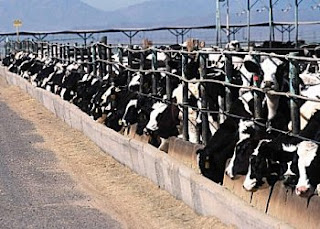
The Quote of the Day comes from Gidon Eshel, a geophysicist at the Bard Center, in an article by Mark Bitman:
"Perhaps the best hope for change lies in consumers’ becoming aware of the true costs of industrial meat production. “When you look at environmental problems in the U.S.,” says Professor Eshel, “nearly all of them have their source in food production and in particular meat production. And factory farming is ‘optimal’ only as long as degrading waterways is free. If dumping this stuff becomes costly — even if it simply carries a non-zero price tag — the entire structure of food production will change dramatically."
In Rethinking the Meat Guzzler, Bitman pulls together a concise reality check that points to the global impact of industrial meat production on the environment. The high energy costs of growing meat are plain to see here. While a rough approximation of one-quarter of the world's population suffers today from hunger or malnutrition, the majority of corn and soy grown goes to feed lots of beef, pork and chicken.
Bitman, author of How to Cook Everything Vegetarian, is not a vegetarian. And neither am I. I will be the first to say that everything tastes better with bacon and salumi is proof that there is a benevolent God.
But Bitman and Michael Pollan ("Eat food. Not too much. Mostly plants.") and others point out that we really are what we eat, and, that industrial meat production goes hand in glove with the eve of personal health and environmental destruction. Qualities and values like organic, locally produced, grass-fed, and localvore need to move beyond trendy marketing terms and into the everyday vocabulary of answering the question "So, what's for dinner?"
No comments:
Post a Comment